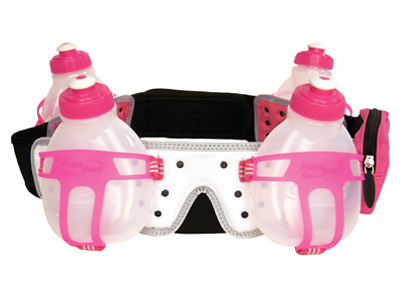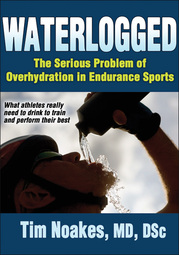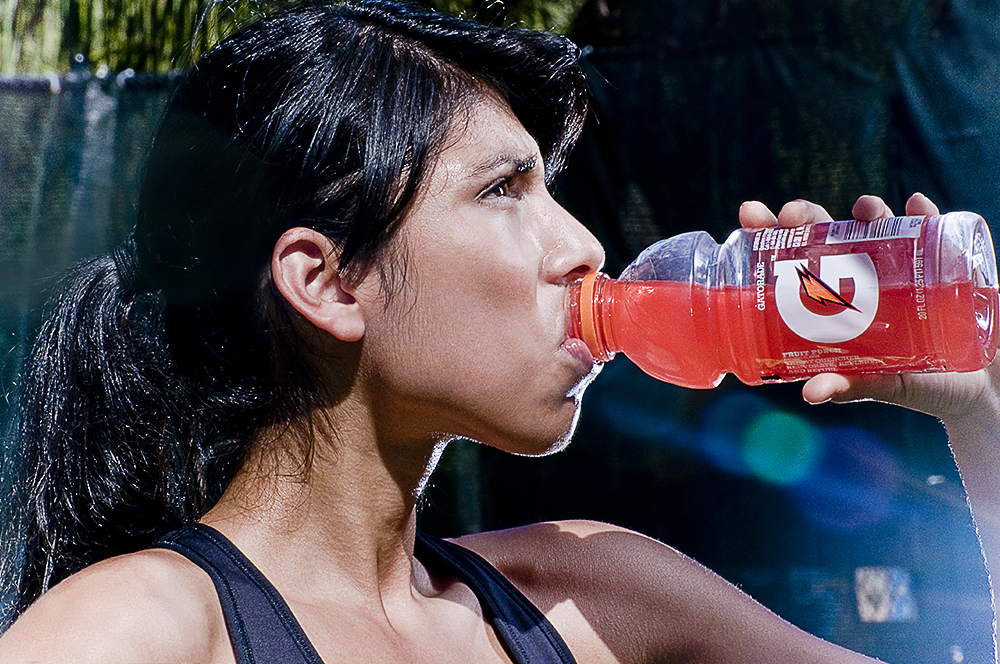Waterlogged: Interview with Dr. Tim Noakes

/
“Drink lots of water if you want to lose fat!”
“If you’re thirsty, you’re already dehydrated!”
Sound familiar? Sure, of course. If you’re into running and other endurance sports, you might even own one of those bandolier-style fuel belts, like this:
 |
And this might look like you during or after training:
|
|
Well guess what: That’s probably BS, like 95% of the mainstream information about what counts as “good” nutrition and exercise. And in fact, over-drinking might even be dangerous.
Fluid balance and health
The balance of fluid and electrolytes (dissolved mineral ions) in our bodies is critical to health and proper function. Sodium is one of the most important ions in our bodies, and is critical for regulating things like blood pressure. Hyponatremia is a condition of electrolyte imbalance, in which there is too little sodium relative to water. (Sodium has the chemical symbol “Na”, and “hypo” means “under”; hence “hyponatremia” = “too little sodium”.)
Hyponatremia is not widely known but it’s more common than people realize, and it can be deadly. Blood pressure and volume are thrown off. Cells in the brain swell with water but there is no place for the extra volume to go — your skull is a pretty tight helmet. The result: Neurological symptoms ranging from mild (dizziness and disorientation) to severe (the brain centres that handle important stuff like breathing and heart rate shut down).
Here’s the critical point: In otherwise healthy people, most of the time hyponatremia is caused by simply drinking too much.
Unfortunately, hyponatremia is often not well recognized or understood. Data on hyponatremia are hard to come by, because often hyponatremia looks like other things, especially in athletes.
For example, heart failure can just look like, well, heart failure. I mean c’mon, is anyone really surprised when someone who puts their body through a grueling physical challenge has a heart attack? It seems like a tragic but sensible explanation, especially in a culture where the bulk of the population (so to speak) is generally unaccustomed to tough physical labours. This also holds for things like seizures, muscle cramping, fatigue, nausea, etc. Throwing up in the fourth hour of an Ironman just seems pretty normal. (Heck, I kind of want to upchuck just thinking about it.) Thus, few medical personnel might think to look for hyponatremia as a root cause — yet fluid and electrolyte imbalance might be the most important factor.
 And of course we’re all supposed to stay hydrated right? So maybe if a runner comes to us with dizziness then we should give them more water, right? Wrong, says legendary sports scientist Dr. Tim Noakes, author of The Lore of Running, and now author of a new book, Waterlogged: The Serious Problem of Overhydration in Endurance Sports (Human Kinetics, 2012). In fact, argues Dr. Noakes, many hyponatremia deaths were likely caused by well-meaning medical personnel who simply didn’t expect to see hyponatremia signs in an exercising population.
And of course we’re all supposed to stay hydrated right? So maybe if a runner comes to us with dizziness then we should give them more water, right? Wrong, says legendary sports scientist Dr. Tim Noakes, author of The Lore of Running, and now author of a new book, Waterlogged: The Serious Problem of Overhydration in Endurance Sports (Human Kinetics, 2012). In fact, argues Dr. Noakes, many hyponatremia deaths were likely caused by well-meaning medical personnel who simply didn’t expect to see hyponatremia signs in an exercising population.
So here’s the situation: Too much water causes a dangerous imbalance, and there have been many cases in which athletes have even died from over-hydration. Yet runners and other athletes are encouraged to drink more, more, more. We’re all terrified of being dehydrated, and constantly told that we have to drink water and sports drinks to be “healthy”, to “lose fat”, and to achieve optimum performance. What gives?
The “hydration industry”
In the last few decades, a “science of hydration” has sprung up around the sports drink industry, which is deeply invested in creating and promoting products. This is the so-called “hydration industry”: the folks who convinced us that chugging Crayola-coloured chemical-tasting water is good for our health.
Dr. Noakes is deeply critical of the “hydration industry” and the commercial products that imply that somehow, humans were unable to sort out that pesky fluid balance thing for the first several million years of evolution, even though single-celled organisms actually seem to handle fluid self-regulation just fine without consuming anything ending in “-ade”.
I had the pleasure of interviewing Dr. Noakes about his new book Waterlogged. It was a deeply revealing interview, covering topics such as:
- how and why hyponatremia is a serious problem in sports;
- the history of the “hydration industry”;
- why the “science of hydration” that brought you “sports drinks” is bad science;
- why women in particular are at risk for hyponatremia;
- our evolutionary past; and
- the role of South African sports science — a culture of runners and a climate of heat — in exploring these questions.
Download this interview in MP3 format (right-click to save to your computer).
And once you’ve listened, head on over to Human Kinetics and check out more about Tim’s book, available in May 2012.
In the meantime, enjoy some PowerThirst:

